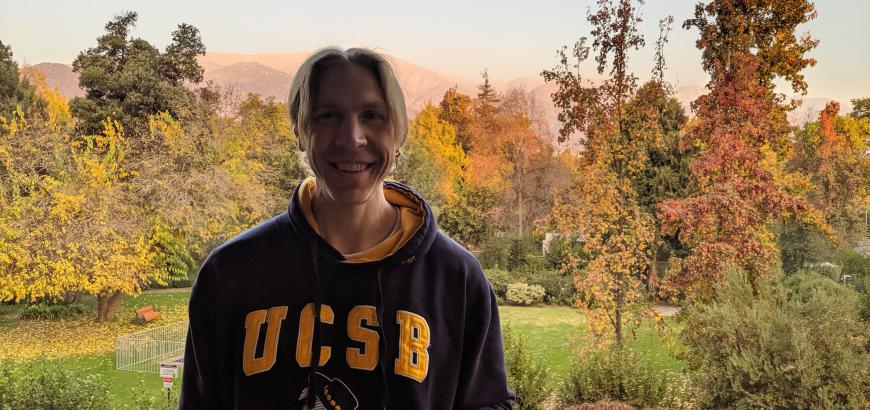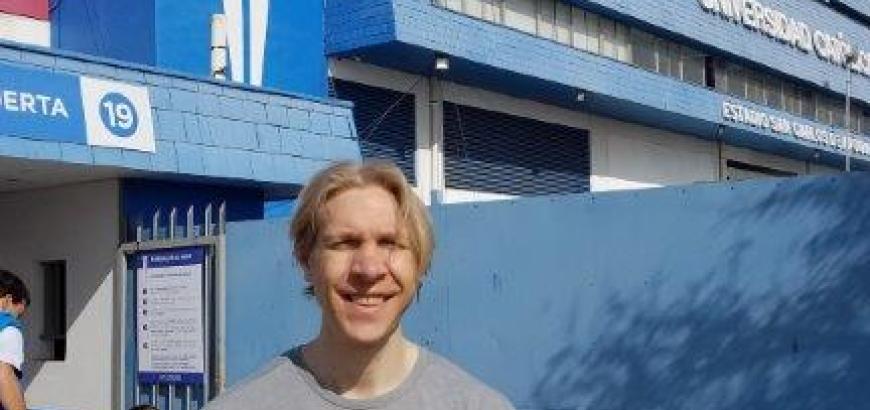By Matthew Lorig
From late March to early June this year, I had the pleasure of working as a Visiting Professor at the University of Chile, which is located in Chile's largest city, Santiago. I moved to Santiago with my family when I was 12 and remained there until I graduated from high school. So, in addition to being a fantastic opportunity to work at a world-class institution, my recent visit to the University of Chile was a return home.
During my visit, I was hosted by Professor Joaquin Fontbona, who is the Chair of the University of Chile's Department of Mathematical Engineering (in Spanish, Departamento de Ingenieria Matematica or DIM). I met Joaquin during a visit to the University of Chile in 2013 and have come to know him as one of the world's brightest applied probabilists. It was a pleasure to have an extended period of time to pick his brain.
The DIM is the home of the Center of Mathematical Modeling (CMM), a government-funded research institute. At its core, the mission of the CMM is to do research in areas of strategic importance to Chile, in particular, mining, forestry, aquaculture, transport, risk analysis and education. Since its founding in 2000, the CMM has formed part of France's Centre National de la Recherche Scientifique (CNRS) network. During my visit to Chile, the CNRS was performing one of their periodic reviews of the CMM and, as such, lunchtime conversation was an interesting mix of Spanish, French and English. Alas, none of the French wore off on me. So, I am still limited to speaking English and Spanish.
The DIM/CMM has a surprisingly large number of connections with the broader mathematics community of the University of Washington (UW). Three professors in UW's department of Mathematics have spent significant time at the DIM/CMM. Gunther Uhlmann completed his undergraduate at the University of Chile. Terry Rockafeller has made numerous visits to Chile to work with his co-author Alejandro Jofre, the former director of the CMM. Krzysztof Burdzy spent a quarter as a Visiting Professor in the DIM/CMM one year prior to my visit. And the CMM recently signed a Memorandum of Understanding with the UW's eScience Institute with the exchange of faculty for the purposes of research and teaching being one of the main goals.
The DIM/CMM has, for some time, wanted to have faculty doing research and teaching in the area of financial mathematics. And, one of the purposes of my visit was to kick-start this process. During my time in Santiago, in addition to discussing research with DIM/CMM faculty, I gave a 10-week course on Modern Methods of Financial Derivative Pricing. Because all DIM students receive rigorous training in probability, stochastic processes, and partial differential equations, I was able to teach this course at a higher level than I had initially anticipated. Teaching the course was beneficial to me in (at least two) ways. First, it gave me the opportunity to brush up on my Spanish. Second, I used teaching the course as an opportunity to completely re-write and update my notes for the introductory financial derivatives course that I teach here at the UW. In addition to the 10-week course, I also hosted a special session for undergraduates with the aim of helping them navigate the process of applying to PhD programs in the United States.
Of course, my time in Chile was not all work with no play. My parents still live in Santiago on a part-time basis. And, I spent a number of weekends with them sipping fine Chilean wine and enjoying the spectacular view of the Andes Mountains from their apartment patio. I was also able to go to a Universidad Catolica (UC) football (i.e., soccer) match with my father. The UC is one of Chile's top football clubs. Their home stadium sits in the foothills of the Andes mountains and is, in my view, the best place in the world to watch a football match. The UC played well but, in the end, lost the match. As my father and I exited the stadiums, I heard a number of fans muttering one of my favorite Chilean phrases: "Jugamos como nunca. Perdimos como siempre." We played like never before. But, we lost like always.
It was truly a joy to further strengthen the bonds between the mathematics communities of the University of Chile and the UW. I am already looking forward to reconnecting with a few of my Chilean colleagues, some of whom will be visiting Seattle for the 2019 Institute for Operations Research and Management Sciences (INFORMS) Annual Meeting.

